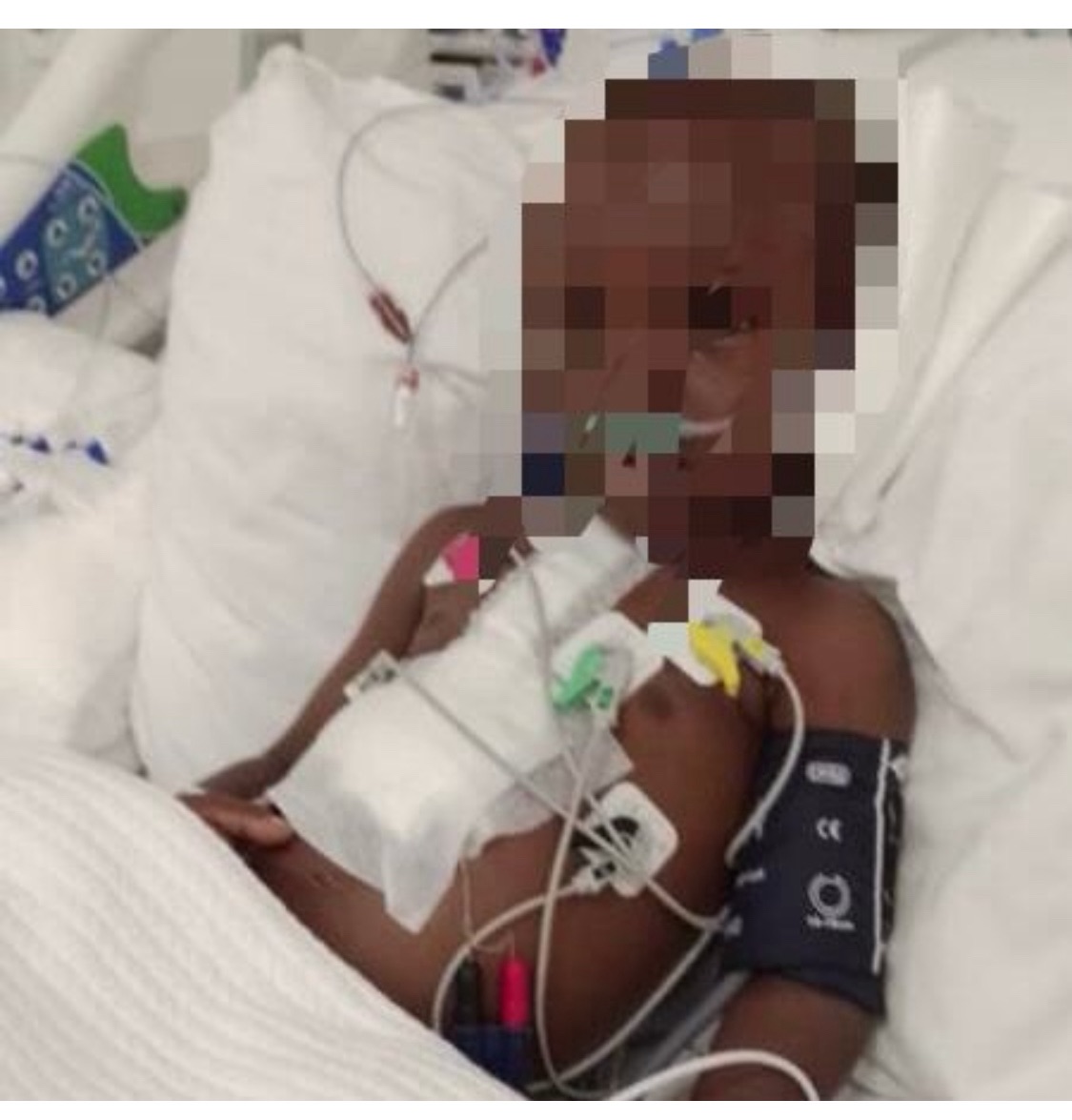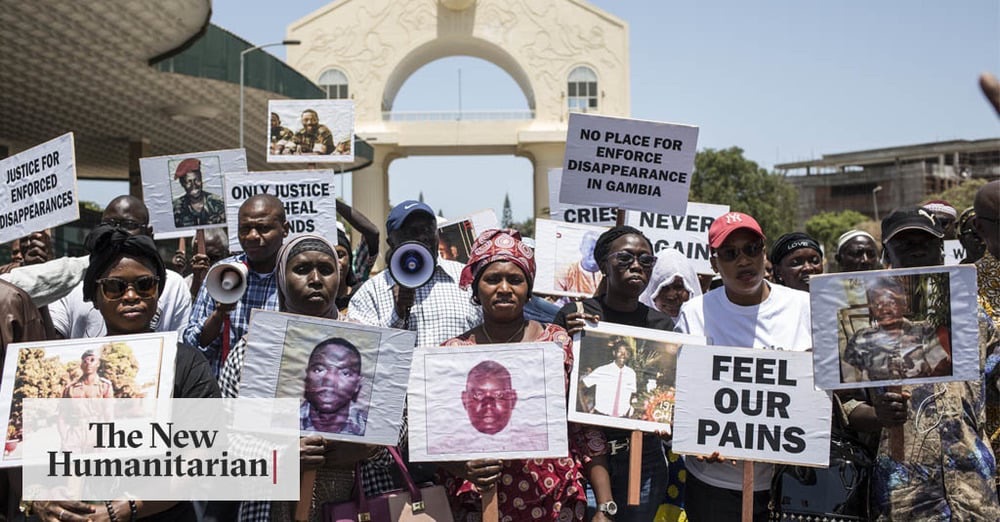By Nyima Sillah

Every now and then, a story of an overseas treatment support request is published in the newspapers. Most of the ailments are confirmed by Gambia’s health authorities to be untreatable in the country. The only hope for survival therefore lies outside which comes with a real struggle to acquire financial needs. In the process, many would die for lack of access to resources for overseas treatment.
In 2020, three years ago, a little over one-year-old boy was the victim of heart disease, one of the commonest ailments requiring overseas treatment. His mother Salaam Jarju was cooking when she noticed an unusual noise just outside the kitchen.
She saw her son lying on the ground—fainted. Salaam and her husband, Hassan Bossu, rushed their son to the Africmed clinic at Brusubi where the boy was given medication. They thought it was normal sickness. This was in 2020.
“A few days later, it happened again and we took him to Medicare in Westfield where he was diagnosed with heart failure and the doctor advised us to take him for overseas treatment,” Hassan, who is a Gambia Revenue Authority (GRA) staff, told this medium in an interview.
They would take their son to Kaolack in Senegal for the treatment. Salaam and her son spent two weeks and three days in there before Hassan told them to return due to financial constraints. He had spent about D57, 000 for their trip and stay in Kaolack.

Hassan further explained that they keep giving their son medication like the doctors prescribed. They visited Edward Francis Small Teaching Hospital (EFSTH) where the boy got medication that made him feel better. But that wasn’t enough!
He wrote a letter to EFSTH seeking assistance. An official from the hospital told him that they used to have a sponsor, but they don’t hear from the person anymore. He also wrote to a few top businessmen in the country for help, but they never got back to him. This hits Hassan hard, knowing that his son was dying and he couldn’t get funds to facilitate his treatment.
“We later contacted the M.L Foundation who assisted us to take him to Turkey for treatment. Before his process to Turkey, I spent over D175, 000 just for him to be cured because we were told that if it is not cured early, it will affect him in his adult age. I was bankrupt because all I wanted was to see my son get better,” Hassan said.
Explaining further, Hassan said his wife spent one week in Turkey with his son who had a successful surgery there. His wife called and told him that they are all fine. He even spoke with his son.
“He told me ‘Dad, now I am okay. I want to come back home. I have recovered’. That morning conversation was the last time I spoke with my son,” Hassan said.
Hassan was later contacted by the Turkey doctor and the Chief Executive Officer (CEO) of ML Heart Foundation, Modoulamin Camara, in a joint telephone conversation. They informed him that his son had some complications after the surgery. The boy was vomiting continuously which led to his death.
The Turkish doctor didn’t have the courage to tell the mother who was patiently sitting, waiting for her son after one of the doctors took him away when he started vomiting. The mother thought it’s normal and his little baby would be back on the bed again. On the contrary, her son passed away on 14th June 2022 aged four.
“That was the last time I saw my son,” Salaam recalled. “I never thought my little boy was going to leave us soon but his memories will always be with us,” he emotionally explained.”
According to Mayo Clinic (the largest integrated, not-for-profit medical group practice in the world), heart failure occurs when the heart muscle doesn’t pump blood as well as it should. When this happens, blood often backs up and fluid can build up in the lungs, causing shortness of breath.
This condition has no cure. But with treatment “such as healthy lifestyle changes, medicines, some devices, and procedures can help many people have a higher quality of life.”

Born with heart failure
Hassan and Salaam’s story is not unique. Tijan Touray and Binta Marrong have theirs to tell. Also another boy, Binta said their son was born with heart failure. But they learned of his condition when he was three months old.
“When the baby was born, I was taking care of him but I realised that his heartbeat is different from others. I told his dad and we took him for several checkups. At last, he was diagnosed at the Banjulding Hospital and they referred us to the Medical Research Council (MRC). We have been doing all our appointments there and he was given good care because he even got an MRC card,” the tearful mother explained.
Few years later, his condition worsened as the condition weakened him. He easily get tired when he starts playing with kids. He will stop playing and sit in one place. He got tired when he walked long distances too.
“We took him to the nearest school in our neighborhood so that he can be close to us; because when it attacks him, he suffers a lot. He does not like a tight environment and he always wants to be in a free space.”

Tijan said he continuously spent money for his child’s treatment because he wanted him to be a normal child and live peacefully. Determined of his child’s health, he went to the Ministry of Health in 2019 to seek assistance to no avail.
The lady he found there told him that they don’t have funding, but she proffered to help him create a GoFundMe for his child because such treatments are expensive and an individual cannot do it alone. Tijan agreed. But they didn’t get a single butut from the online fundraising platform.
According to him, when they went to Kanifing General Hospital to seek funding, they were told that they only help two people in a year because they don’t have funds.
“I wrote to Fatou Bah Barrow Foundation (FaBB) and one of President Adama Barrow’s nephews, but they never got back to me. I was going to mortgage my business for my son to go to India when I was told by my Indian partner that he can be cured in India,” he explained.
It was during this interval when someone linked them with the ML Heart Foundation. They got in touch with the foundation’s CEO Modoulamin who helped them transport their baby to Turkey. He was there with Tijan’s mother for over one week.
“But unfortunately, during the surgery, my little son died,” he said, and tears started to cascade down his cheeks. He said his son’s death was shocking because he never thought, even once, that he “will go so soon”. He was five years old when he passed on.
Binta opined that their son’s death is as a result of negligence and discrimination from the side of the government. She said if this was the child of a top government official, they would have taken care of the child.
“The health ministry never gets back to us, not even once. They don’t show us any care. When the poor little boy died, the doctor said the baby was supposed to get the treatment at an early age which we tried so hard but it was impossible,” she told The Voice in an exclusive interview.
Family breadwinner succumb to heart failure
Fatou Manneh’s husband (who pleaded for anonymity for her husband) used to be the breadwinner of their family. A staffer of one of the top governmental organizations, he was hard-working and determined.
Before he got diagnosed with heart failure, they thought it was normal sickness. He believed in general check-ups and whenever they went to the doctors, they only provided check ups and told them he was fine.
“A few months later, his condition became serious. We took him to EFSTH and they diagnosed him with heart failure,” he said.
She was shocked. Her husband stopped working. They started his treatment which she said was expensive. She took him to Senegal for a few weeks but the bills were expensive. When he felt better, they returned. In the Gambia, they were advised to take him to India for overseas treatment. Before they could leave The Gambia for India, her husband died at Ndemban Clinic, Bakau.
“My husband was my everything in life; his death is something that my kids and I still cannot believe. I took it as a will of Allah but our health sector needs improvement, especially in the area of heart patients,” Fatou decried.

ML Heart Foundation’s Support
ML Heart Foundation CEO Modoulamin, also known as ML, said in every 100 people, you have 10 new cases of heart failure, adding that this number is increasing. The health advocate said health is not only about treatment. For him, prevention is the most important thing.
Thus, he urged the health ministry to do a sensitization on heart diseases. According to him, some types of heart diseases are preventable like rheumatic heart diseases.
“So if sensitization is done in this area, it will help reduce it and also provide a conducive environment for the patients to be able to have their treatment,” he said.
Speaking further, Modoulamin said people contact him when they are advised to go for overseas treatment and he had tried twice to have a Memorandum of Understanding (MoU) with the government to no avail.
“I wrote to the Ministry of Health. No response. I contacted the government’s spokesperson to help us have funds but he said the government has no funds for such cases, so I have no positive response from both ends,” he said.

The ML Foundation CEO said he is here to complement the government’s efforts, and if he has their support, he can bring some doctors from Turkey to offer some free treatment in the country.
“I have the contact but I can’t do it because I am alone,” he said.
Modoulamin said that the cases are increasing daily because some patients will be on medication for life. He said some patients will not need any medication after surgery.
He disclosed that the amount for surgery depends on the type of diagnosis, but the lowest amount is $9500 to $10,000 which is paid by my partners. ML said he usually sends the patients to Turkey, Israel or India, but it’s more expensive in Europe.
“We usually spend D30, 000 to D35, 000, excluding the surgery fee. This year we sent over 13 patients on overseas treatment. Our activities are limited because of the challenges compared to last year,” he said.
He explained that due to the earthquake in Turkey they couldn’t send a lot of patients, while the war in Israel is also barring them from sending patients there.

‘EFSTH Lacks Cardiology Lab’
The Chief Medical Director (CMD) of EFSTH Dr. Ammar Al Jafari admitted that they have a problem with heart issues. He said in most cases, they can give patients treatment as they have a good cardiology diagnostic center. The only problem is they don’t have a cardiology lab at the moment.
“But we are working with the Ministry of Health to provide some of the facilities. In a few years to come, no one will go for overseas treatment,” he said.
He said their hospital only supports patients with medical reports when they opt for overseas treatment, saying the patients go to their line ministry to collect the medical reports and look for funding because the hospital cannot sponsor them.

Special Budget Allocated For Overseas Treatment
The health ministry’s Director of Health Service, Dr. Mustapha Bittaye, said there is a special budget allocated for overseas treatment annually, but there are procedures.
“Every year, we assist different patients to go for overseas treatment in India, Turkey, or Senegal depending on the case and the type of sickness,” he said.
According to him, when patients get the medical and the board reports, then three doctors sit and analyze the condition of the patients to look at the severity of their conditions.
From there, he said they send it to the finance ministry who will process reports and send them to the treasury department who will then send them to the respective Gambian embassy in the country the patients are going. He added that the ambassador will do the payment in that particular hospital.
Responding to patients’ criticism towards the government, Bittaye said the patients have to understand the procedures, saying they are not denying treatment. He explained that if the allocated money is not exhausted at the end of the year, they have to return it.
“Some of the treatments need open heart surgery which is not available in The Gambia, but we have funding from the Germany government for a place to be established in Farato Phase II establishment,” he said.
With regard to the M.L Heart Foundation MoU proposition, Bittaye said not all MoUs are accepted despite its benefit for all. He said when they receive MoUs they send them to the Ministry of Justice as an advisory body. And at times the aforesaid ministry rejects the MoUs which they adhere to.

Heart Specialist at EFSTH Lamin ES Jaiteh said rheumatic heart disease is a cause of heart failure which one can get through an infection of the throat which eventually affects the heart. Hypertension (high blood pressure) is another cause of heart failure as well as diabetes among others.
Jaiteh said they have most of the medicines in the country for heart failure but sometimes the medicines alone aren’t enough. He warned that if proper mechanisms are not put in place to provide facilities and maximum treatment to the patients, in years to come, it is going to be a catastrophe.
“Because it doesn’t even start with heart failure it starts with the causes of risk factors of the heart like hypertension, diabetes, and Rheumatic Heart Disease. If these are not controlled, you will keep seeing a lot of heart failures and more and more will come in future,” he said.
He said prevention is better than curing and that preventing heart failure is to prevent hypertension, diabetes among other causes of the condition.
“When your child has a sore throat, take the child to the hospital to make sure that the throat is treated on time to prevent rheumatic fever,” he advised, adding that this is how it has been eradicated in other countries.
According to The Gambia Health Policy 2021-2030, health financing in the country remains considerably underfunded despite the overall positive trends in public resources allocated to the health sector. It also noted that the country’s health is mostly funded from external sources.
“The Per capita health expenditure is very low, 23.38 USD and 25.84 USD according to the National Health Account 2016 and 2017respectively, missing the WHO’s recommendation. A cost analysis of the Basic Health Care Package found a (40%) GMD 4.5 billion gap for full implementation of the package in 2017,” the aforesaid policy stated.





